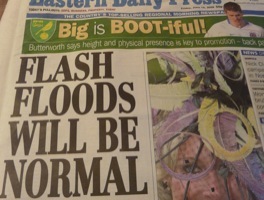Scare stories and strange predictions like those seen in many areas last week will become “the norm” in the years ahead, an expert warned last night, as newspapers forecast once again that climate change will affect “every aspect of our lives”.
Parts of the country were hit last Tuesday by ferocious summer storms not unlike similar storms that have occurred over the past half century and, possibly, beyond. Tonnes of hailstorms fell from the sky, together with acres of newsprint and enough ink to cause the sea level to rise by an estimated “huge amount”.
The most comprehensive research yet into wild predictions made by local newspapers forecasts many more outbreaks of freak news stories, based on nothing more than computer models fed by a series of assumptions presented as fact.
Tim Lenton, who has lectured at the University of East Anglia and writes frequently on climate change, warned that summer rain could decrease by more than one fifth and winter rain increase by 16%. On the other hand, it might not. Equally, icebergs could be a hazard in parts of the Wensum, and there was a real risk of temperate periods leading to a catastrophic lack of interest in the weather as a whole. He added that more rain was likely to fall on the wettest days, and it would probably be dry when it was not raining, except in coastal areas.
“Climate change is going to transform the way we live,” he added. “We will be reading fewer newspapers, which is dangerous for those employed there. But we will continue to believe that freak weather is unique to the last 20 years, despite years of evidence to the contrary. Older people who point this out will continue to be accused of not caring about future generations, despite the fact that many of them have grandchildren who they care very much about.”
Meanwhile newspapers have revealed that there was a heatwave in 2003, and 2000 people died. Of course, 30,000 people die from exposure to cold each year in the UK, according to the BBC, but this is not a useful statistic. It is not caused by greenhouse gases, after all. Fears that roughly 0.1 per cent of people writing in local newspapers know anything about climate change are, if anything, likely to rise in the years ahead.
Readers may have seen that I wrote a letter to the Eastern Daily Press in Norwich on the subject of climate change. It read as follows: “Dear Sir: Councillor Rupert Read castigates Alan Dale for not engaging with UEA’s ‘expert climate scientists’. Mr Dale has to my knowledge spent a huge amount of time trying to get UEA’s well-funded climate scientists to respond to the evidence he presents them with, but has had no success at all. The debate about climate change is far from over. Thousands of experts worldwide dispute man-made climate change.”
Well, that’s what appeared in the paper. What I actually wrote was: “Cllr Rupert Read castigates Alan Dale for not engaging with UEA’s ‘expert climate scientists’. Mr Dale has to my knowledge spent a huge amount of time trying to get UEA’s well-funded climate scientists to respond to the evidence he presents them with, but has had no success at all. While I recognise that Cllr Read, who also works at the UEA when he is not engaged in politics, is likely to take his colleagues’ and friends’ word for it, if he were to look further afield he would find that the debate about climate change is far from over. Thousands of experts worldwide dispute man-made climate change. I am sure that this view would receive short shrift in some places, but people who say the debate is over, and those who do not respond to criticism, must be greeted with some suspicion. Just who is in denial here?”
Obviously not a good question.
